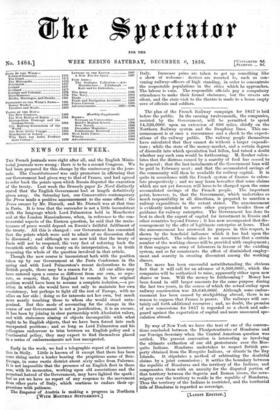NEWS OF THE WEEK.
THE French joutnals were right after all, and the English Minis- terial journals were wrong : there is to be a second Congress. We had been prepared for this change by the controversy in the jour- nals: The Constitutionnel was only premature in affirming that our Government had given way to that of France, and had agreed to refer back the points upon which Russia disputed the execution of the treaty. Last week the Brussels paper Le Nord distinctly stated, that the English Government had at length definitively given away. On Saturday last, our Conservative contemporary the Press made a positive announcement to the same effect : the Press swears by Mr. Disraeli, and Mr. Disraeli was at that time in Paris. It is true that the surrender is not a little inconsistent with the language which Lord Palmerston held in Manchester and at the London Mansionhouse, when, in reference to the con- troversial aspects of the Eastern question, he said that the main- tenance of peace would depend on Russia's faithful fulfilment of the treaty. All this is changed : our Government has consented that the points which were said to admit of no discussion shall be discussed ; and although we are now told that the treaty of Paris will not be reopened, the very fact of referring back the twentieth article of the treaty on its interpretation, is in truth reopening the whole of the question involved in that article.
Though the new course is inconsistent both with the position taken up by our Government at the Paris Conference in the spring and with Lord Palmerston's recent declarations to the British people, there may be a reason for it. All our allies may have entered upon a course so different from our own, so sepa- rate, so remote, that, for England to remain in her original position would have been to assume a complete isolation,—a po- sition in which she would have not only to maintain her own consistency, but perhaps to fight all the rest of Europe, with no allies on her side ; doing so for interests not her own, but much more nearly touching those to whom she would stand anta- gonized. But this mode of accounting for the change in the course of our Government is not a justification, it is an excuse. It has been by joining in close partnership with Absolutist rulers, and with statesmen aiming at objects incompatible with what ought to be English objects, that we have been forced into such unexpected positions ; and so long as Lord Palmerston and his colleagues endeavour to trim between an English policy and a Continental policy, they may expect to find themselves placed in a series of embarrassments not less unexpected.
































